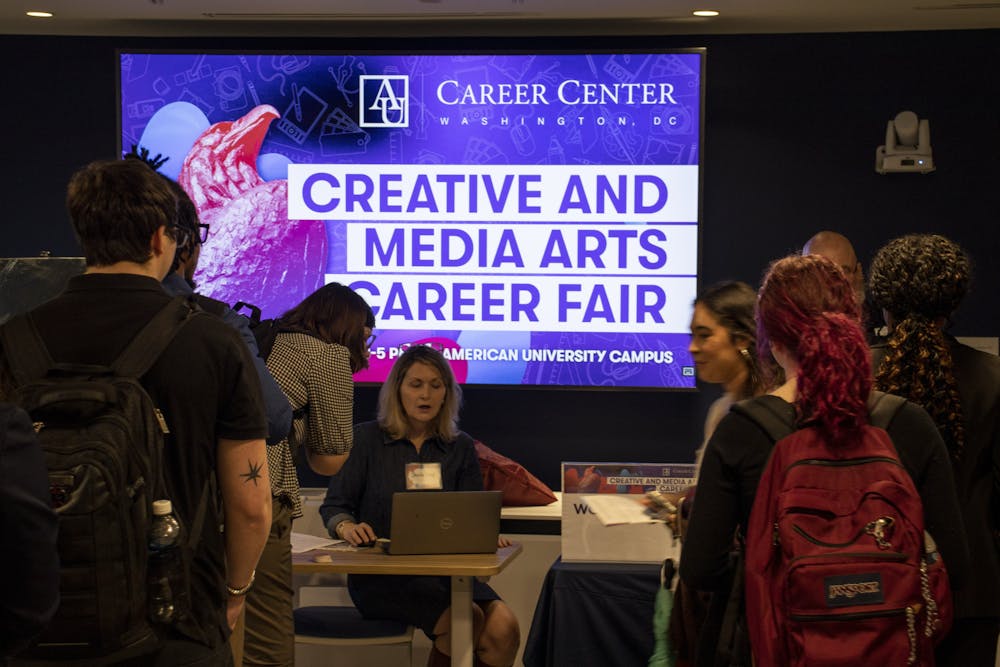Amid spring and summer internship season, students at American University are scrambling last-minute to add skills to their resumes and find opportunities to apply for.
With platforms like LinkedIn in reach for young college students and job markets becoming narrower for new workers since the COVID-19 pandemic, the pressure to find an internship has increased dramatically, according to The Hechinger Report.
Particularly in D.C., where internships on Capitol Hill are commonplace, many students feel the need to acquire an opportunity as soon as possible in their college careers, like Maya Silverstein, a freshman in the School of International Studies and the School of Public Affairs.
“I think there is an immense pressure, especially at AU, to always be doing something or looking for something to do next,” Silverstein said.
Silverstein worked as a legislative intern in Senator Chuck Schumer’s office during her fall semester, answering phone calls from constituents and attending briefings to learn new information important to Schumer’s constituent base. She also managed regular office intern responsibilities, such as carrying and shredding paper around the office.
As a student dual majoring in international studies and political science, interning on the Hill took time away from Silverstein’s student and social life on campus. She found it difficult to manage her time.
Aside from the lengthy commute back and forth to the Capitol and the measly $1000 stipend for her work, Silverstein viewed her internship as a way to meet new people and experience life in government. However, she said that she is aware that there is a huge pressure on AU students to acquire an internship on the Hill.
“I think had I not come in with that experience my first semester, I would almost feel behind, which is ridiculous because you're not,” Silverstein said. “Everyone comes to that at different stages. Even now, I feel like I need to find my second internship.”
Paul Albergo, an adjunct professor in the School of Communication, agrees with this sentiment, noting that this pressure also expands farther than just the University’s campus.
“The more important thing is that there's nothing magical about the title ‘intern,’” Albergo said. “What you really need to think about is ‘what is it that you need in order to get a job in the field that you're interested in?’”
Holding an executive position in the newsroom at Bloomberg Industry Group until 2022 and interning in the home office for a member of Congress early in his career, Albergo is no stranger to internship culture and the idea perpetuated about the value an internship holds in terms of career building.
Albergo teaches classes at AU and Georgetown University to prepare students for internships. Though internships are integral to gaining hands-on experience in any field, Albergo said there are other ways to gain skills and experience outside of them.
“Extracurriculars are not just here to make your life happier on campus,”Albergo said. “They are ways for you to practice much of the professional work that you need to do elsewhere.”
Albergo highlighted that part-time jobs, such as those in the food industry, are also as valuable as an internship on the Hill since they train individuals to problem-solve, work in a team and communicate while under immense pressure.
Almost 90 percent of employers desired students with evidence of problem-solving abilities and 80 percent desired those with teamwork skills, according to the National Association of Colleges and Employers Job Outlook 2025 survey. About two-thirds of employers indicated communication, adaptability and analytical skills as recruitable qualities.
Although it is never too late to think about one’s career path, Albergo urges students to visit the AU Career Center, something he prides as “one of the best career centers” he has ever encountered, if they do feel pressure from internship culture on campus.
Apart from helping with resume building and finding opportunities, the Career Center holds a rich network of alums and faculty working in various fields that can help create lasting connections.
“What we know from research is that students who engage in their career center are more likely to find a job quicker than someone who doesn't,” Albergo said. “It’s not something that is just available to you while you're in school. You could get to go back to them later on.”
So yes, take any opportunity at hand and send applications for everything and anything. However, rejection from opportunities or a lack of relevant experience does not discount skills that could be learned somewhere else. Like Albergo emphasizes, experience is experience.
This article was edited by Cara Halford, Tyler Davis and Abigail Turner. Copy editing done by Luna Jinks, Hannah Langenfeld, Ella Rousseau and Sabine Kanter-Huchting.





